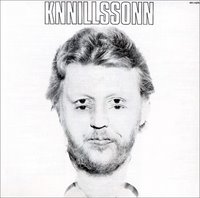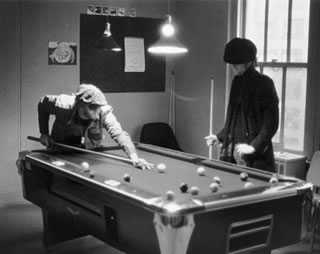Harry Nilsson: Off the Deep End and Back Again


Here are two albums that were released just three years apart, but each is simultaneously ahead of its time as well as living in the past. 1974's Pussy Cats and 1977's Knnillssonn represent the best of Harry Nilsson's post-Nilsson Schmilsson (1971) output. It has been well documented that Nilsson was good buddies with the Beatles, particularly John Lennon and Ringo Starr. Nilsson was Lennon's partner-in-crime during the former Beatle's infamous "Lost Weekend" of 1974. To put it simply, these guys went on an alcohol-fueld rampage through Los Angeles, getting kicked out of clubs left and right and generally causing quite the ruckus.
 They decided to make an album together, with Nilsson singing and writing the songs (although about half of the album's songs are covers) and Lennon producing. This was Pussy Cats. From the opener, a cover of Jimmy Cliff's "Many Rivers to Cross", the album has a umistakably strong early 70s Lennon feel. During the sessions, Nilsson ruptured a vocal cord. Fearing that Lennon would then abandon the recording, he kept this private and continued to sing until his voice was completely gone. You can hear the strain in Nilsson's voice on almost every track.
They decided to make an album together, with Nilsson singing and writing the songs (although about half of the album's songs are covers) and Lennon producing. This was Pussy Cats. From the opener, a cover of Jimmy Cliff's "Many Rivers to Cross", the album has a umistakably strong early 70s Lennon feel. During the sessions, Nilsson ruptured a vocal cord. Fearing that Lennon would then abandon the recording, he kept this private and continued to sing until his voice was completely gone. You can hear the strain in Nilsson's voice on almost every track.It's a unique album in Nilsson's catalogue, and dismisses the pop sensibilities and harmonies that he'd become known for. Instead, we have a rock'n'roll record that is obviously influenced by the boys' alcohol and partying. The album accurately captures this sound, but more than that, it harnassed the feeling of these particular sessions, both in and out of the studio. At its core, Pussy Cats is the ultimate drinking album.
The Walkmen have recently recorded a song-by-song cover of Pussy Cats, which they will release later this year. It was recorded as tribute to their recording studio, Marcata, which closed after this album was completed.
Knnillssonn is the exact opposite. Four albums later, this was Nilsson's final effort for RCA, after which he asked to be let out of his contract. All of the songs are originals, and while he did have other material released afterwards, this is approriately regarded as his swansong. Harry said that this was his favorite of all of his albums. By this time, Nilsson's vocal cords had healed, and his voice rarely sounded as beautiful and pure as it does on the opening track, "All I Think About Is You". The album is heavy on the strings and was definitely out of step with popular music at the time: disco. It's a collection of orchestral pop songs that has more in common with his late 60s output than anything else. Still showcasing much of his vocal range and varied singing styles, the album also includes loads of Nilsson's witty and sometimes bizarre songwriting. "Who Done It?" is an exciting murder mystery, while "Laughin' Man" sounds like it could have come from the 40s or 50s. I'm pretty confident that this is one of Jon Brion's most influential albums.
Temporary free downloads:
"Many Rivers to Cross"
"All I Think About Is You"

1 Comments:
"All I Think About Is You" is all I can listen to now. Discovering Harry Nilsson is like finding a pirate's treasure chest filled with gold doubloons...but the doubloons are tunes.
Post a Comment
<< Home